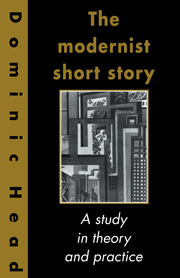Book contents
- Frontmatter
- Contents
- Preface
- Acknowledgements
- 1 The short story: theories and definitions
- 2 James Joyce: the non-epiphany principle
- 3 Virginia Woolf: experiments in genre
- 4 Katherine Mansfield: the impersonal short story
- 5 Wyndham Lewis: the Vorticist short story
- 6 Malcolm Lowry: expanding circles
- 7 Conclusion: contemporary issues
- Notes
- Bibliography
- Index
4 - Katherine Mansfield: the impersonal short story
Published online by Cambridge University Press: 06 July 2010
- Frontmatter
- Contents
- Preface
- Acknowledgements
- 1 The short story: theories and definitions
- 2 James Joyce: the non-epiphany principle
- 3 Virginia Woolf: experiments in genre
- 4 Katherine Mansfield: the impersonal short story
- 5 Wyndham Lewis: the Vorticist short story
- 6 Malcolm Lowry: expanding circles
- 7 Conclusion: contemporary issues
- Notes
- Bibliography
- Index
Summary
Katherine Mansfield's modernism, like that of Joyce or Woolf, stems from an ambivalent attitude to the nature of personality; and this ambivalence is reflected in the structure and language of her stories. In her journal she once described her philosophy as ‘the defeat of the personal’, a phrase which has a particular relevance to her investigations into identity and personality. The conflation between the problematic view of character and an ambiguous short story technique has already been demonstrated in relation to ‘Bliss’, in which an equivocal ‘epiphany’ emphasizes Bertha Young's personal confusion. The reading of this story made in the opening chapter suggests a dawning awareness on the protagonist's part of her latent homosexuality, a subtext partly suppressed by the social taboo it simultaneously criticizes. The suppression of sexuality results in confusion for Bertha and an imitative ambiguity in the story's form, and this makes it appear indeterminate, admitting the possibility of other readings. One such is that made by Saralyn Daly, who feels that Bertha, ‘a treacherously fallible narrator’, has her suspicions of the affair between Pearl Fulton and her husband, yet refuses to acknowledge it, and engages in an extended attempt at self-deception. Her sense of intimacy with Pearl can therefore be seen as a fanciful self-projection designed by Bertha ‘to persuade herself that she feels “just what” the woman who is loved by her husband does’.
- Type
- Chapter
- Information
- The Modernist Short StoryA Study in Theory and Practice, pp. 109 - 138Publisher: Cambridge University PressPrint publication year: 1992
- 1
- Cited by



